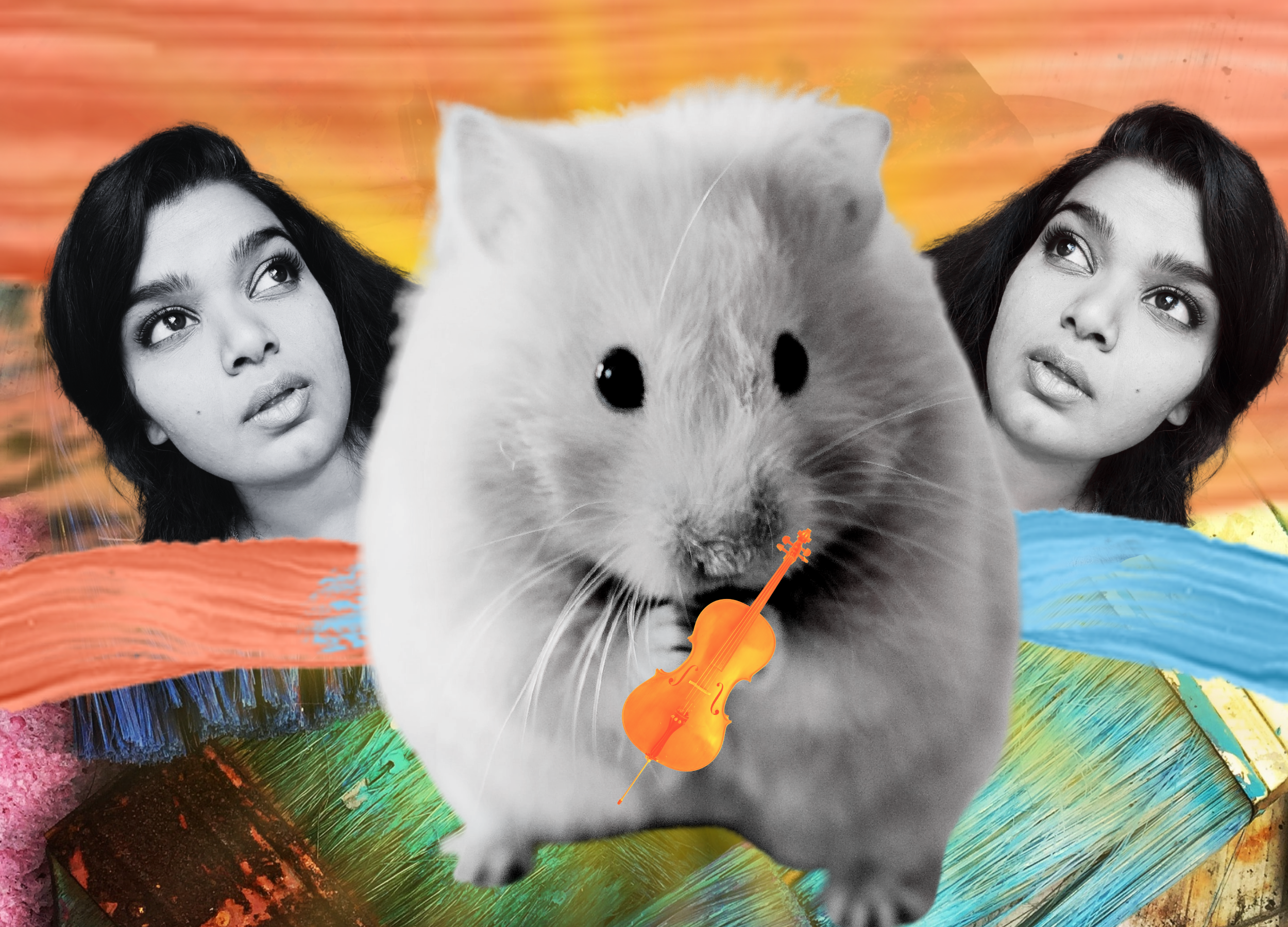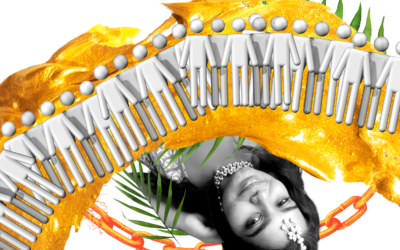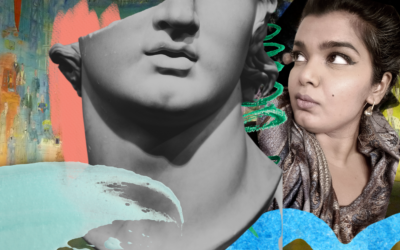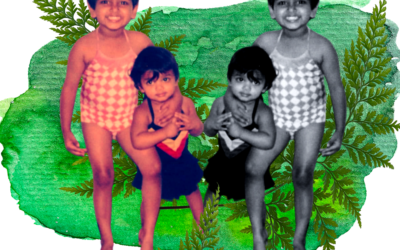The universe folded in upon itself.
The woman transformed into a mirror for me. All her inadequacies and hesitations were mine. All of my encouragement was hers. I realized a deep truth that afternoon. This is the story of that moment.
*
The Smiling Lady in Bali Art Shop
I’m standing on the top floor of a rickety overstacked stationery shop in Canggu, Bali. The shop assistant smiles at me. I smile back. We start talking. Her name is Nur. I learned that she came to Bali alone – leaving all her friends and family in Java. Nur has recently started painting.
‘Why don’t you come over and we can paint together?’
A little taken aback at her generosity, I ask to see pictures of her paintings. And that’s when her entire body posture changes. Nur shrugs and shakes her head.
‘Oh….no! I’m not any good. I don’t really…”
Come on, I insist. I’d love to see something.
Nur takes out her phone and keeps it very close to her body. Her fingers are scrolling, scrolling, scrolling. Finally, she pulls up a picture of a beautiful landscape splashed onto a massive canvas with thick acrylic paints.
It is stunning.
I’m confused by her reticence. As I tell her just how incredible her work is, she begins to show me more.
Wow. Wow. Wow. Do you sell your work, I ask her?
And that’s it.
Nur pulls her phone away from me. Nooooo! With a smile, she leaves my side.
So, I continue browsing. I want to buy everything I see…but instead I settle for a few colorful brush pens. With my basket weighing a little heavier on the crook of my arm, I go to the counter to pay. I’m not surprised when I see Nur again. She looks at all the pens in my basket. What kind of art do you create with this?
She asks to see a picture of my work.
I’m horrified.
I mumble: I don’t paint on a large canvas. I only doodle with pens in my notebook. A little bit of this and that.
And then, I’m the one being guarded with my cellphone. Scrolling through pictures; struggling to find something worthy. Nur is all smiles and encouragement. She asks to see more. I realize I’m happy to share my doodles with her. After looking at all my drawings she asks me – do you sell your work?
My heart sank. I felt the sheer ridiculousness of the question in my stomach. Me? Do I sell this? This amateur work? Seriously? It’s unbelievable that she would even ask that. Shaking my head, I put my phone back into my pocket. Surely she couldn’t, she didn’t, believe that I could sell this stuff? Surely?
Later that evening I wondered about the contrast in my behavior. Why was it so much easier to encourage her than to step into my own stature as an artist? Ergh. I had some tough truths to face.
Cheering can be DANGEROUS sport
Being an artist is incredible, thankless and terrifying. The first few years are the toughest. The world will growl: You are a fraud to call yourself an artist. You should quit. The world will tell you this over and over and over and over again.
And if you aren’t careful, you end up believing it. You may do a doodle on the side…but for the most part you end up becoming somebody else’s cheerleader. You encourage others to follow their artistic pursuits and convince yourself that you don’t have the hand to paint or the tongue to sing
Claiming your identity is WORK
What separates an Artist from the rest of us?
Not too much. I believe we all have creative sparks, intuitions and longing. We have bizarre thoughts and curiosity. BUT artists OWN their identity and right to act on their creativity and curiosity. Artists have a kind of arrogance and confidence which says: I WILL think deeply, weirdly and create often. Artists put in the time, energy and attention to owning, developing and expressing the connection between soul, heart and the material world.
And this arrogance, confidence and interest is what the budding artist needs. You see, when you are starting out as an artist – you’ve got a lot to learn and unlearn. Speaking from personal and professional experience – there is A LOT of work that needs to happen for an artist to claim their rightful place as an artist. An artist needs guidance, confidence and support. Budding artists need a lot of time, resources and ample space JUST to start the process.
There is a lot of initial energy needed to clear the path ahead of you, to claim your right as an artist. There is an enormous amount of energy needed to move through the inertia and to quieten the voices.
It is so much easier to encourage other people to create, draw, write, act, and sing. It is so much easier to cheer another person on – THAN to take the first gnarly confusing steps in the forest of your mind. I spent most of my life doing this and now I help my clients through the very same thing.
Artist is a VERB.
Art is a process. Art is something you can create, I can create. And in fact, we must.
So who has the right to call themselves an Artist? As far as I am concerned, just about anyone who is dedicated to expressing the inner soul through mastery of technique. This looks like being an incredible chef, painter or nail technician. I see the artistry in the meticulous repetitive acts of expression all around.
What if you are just starting out? Yes, yes, yes. Even at that point you are an artist. I love using Carol Dweck’s growth mindset to demystify art. Dweck will tell us we can learn and work our way to being an Artist. No matter where you may be, if you make art… you are an artist.
In the words of playwright Quiara Alegría Hudes: “Are music, writing, and spirit teachable? Yes, just like lungs are born knowing how to breathe, but can learn new ways to integrate breath through musculature, observation, and practice.”
Understanding art as a process is a paradigm shift and a power move too.
No – you don’t need to have a MFA to write plays or paint. It is a way in which we challenge the narrative of who gets to tell his story, who gets to paint or write poetry. Understanding process – means you claim your identity as a thinker, creator, lover, and artist.
Are you an Artist? Stop being the cheerleader
Stop profusely and solely encouraging others. If you have a sneaking suspicion that you are harboring artistic tendencies – stop giving away your energy and power to others around you. YOU need all the encouragement right now. So find people and places who will give you a nod of approval and boost of confidence.
If you’re a patron of the arts…there is a high chance that you are an artist. You might be just in the beginning stages of it. If you can SEE the depth of an artist’s creation, if you see potential…that is because the POTENTIAL is alive within you. You probably will get just as much pleasure, if not more, if you were able to consistently create your own artist.
The more you cheer yourself on, well the more you will find the artist within yourself and not outside.
POUR INTO YOURSELF through self-awareness
At some point in time – you need to feed yourself first. Constantly cheering others can very quickly transform into jealousy and self evaluation…which can shut you down.
So how do we move from being a cheerleader of others to our own biggest supporter?
Self awareness. Self awareness. Self awareness.
This is what I mean; use these questions to locate yourself in the journey
- Where are you in the process of your Artist journey?
- Can you listen with wisdom when the time has come to stop looking outwards for inspiration, guidance and encouragement?
- Can you recognise your own positionality with regards to artistry?
- Are you a beginner or are you in the messy middle?
Reframe your awe of artists.
Writing this article was difficult for me. It felt like an awful selfish diatribe against cheering others on. That is ABSOLUTELY not my point. Being with and supporting artists is crucial. The question is how do we do it…and at what price?
Here’s how to cheer others in a way that is supportive to your practice. When you see a beautiful piece of work – you may say something like:
“Wow. That’s incredible. I could never create something like that.’
That is what I used to do (and sometimes still do). Now, I’ve trained myself to remark within my head:
- Wow, that’s an incredible piece of art. I wonder how many years of work she had to do to get to that point?
- I wonder how much support she had?
- Did she have emotional, financial and communal support to make this piece?
- I wonder how many demoralizing voices she ever had in her head?
- How many edits do you reckon Toni Morrison had to go through just to get this sentence feel so smooth and effortless?
- Just how many times did Ken Wilber think this idea through and out loud before he was able to capture it?”
By asking these questions I make the artist a human. Whether it is Joni Mitchell, Georgia O’Keeffe or my friend in the art shop, it doesn’t matter. I realize this is just another person – like me, trying to create something. Struggling, enjoying and trying to deal with the oh-so-humanness of creating what we receive in the form of divine inspiration.
“It’s normal to take a while. You’ve just gotta fight your way through.”
I want to leave you with this final quote from Ira Glass which has helped me over and over and over again:




